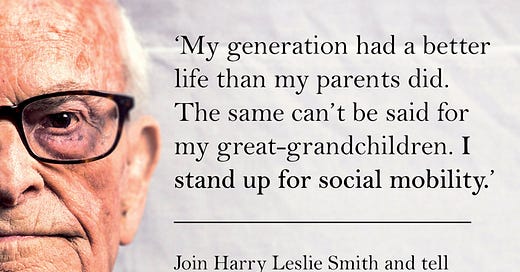Harry Leslie Smith Endorses Trade Unionism to end economic inequality
In 2017 Harry Leslie Smith gave a series of speeches on trade unionism.
I was born almost a hundred years ago. I came into existence in a slum that festered around a coal mine like a sceptic wound oozes puss onto healthy skin. My dad earned his crust of bread at that colliery. He worked the coalface like all of his kin had done for generations before him. 1923, the year of my birth, was a time of harsh extremes for the people of Britain. The working class lived no better than domestic farm animals, whilst the entitled lived a life of extreme pleasure.
For workers like my dad, existence was a hard grind. But my dad had endless optimism for the future. His hope for a better tomorrow wasn't misguided or pollyannish. No, his hope was a pragmatic trust in the working man's desire to build a better future for themselves and their community through trade unionism.
My father was a proud socialist and a member of the NUM. He understood trade unionism was not just about changing present labour conditions. It was also about establishing an unbreakable legacy of fair play in the workplace.
My dad knew that to belong to a union was a right that came with responsibilities. It’s why he took me onto the pickets line during the 1926 General Strike; so I could see, as he told me much later on, “how good men stand together to defend the rights of all who struggle in this rough and ready world.” Even though the miners in that General Strike lost their battle against the pit owners, the unbreakable spirit of the trade unions, who participated in that conflict galvanised a generation to stand strong and united against barbarous labour practices during the Great Depression. The trade movement kept hope alive in the hearts of workers during the 1930s when Britain was at its lowest economic ebb, and millions stood on the breadline instead of toiling on the factory floor. Britain's strong trade union movement in the 1930s created an ethos of solidarity among the working class.
During the Second World War, trade unionism along with the Labour Party ensured that when Hitler was defeated, peace would include a Welfare State as its dividend. In 1945, for the first time in our nation's history, a Labour government was elected who brought prosperity to all through the pragmatic introduction of socialism to blunt the inequalities created by the excesses of capitalism. Sadly, the generations that followed mine became enthralled by consumerism like a moth is entranced by a flame. They forgot the hard, bleak history of their grandparents.
Now Britain in the twenty-first century faces economic and political storms that harken back to my youth when jobs were tenuous and right-wing governments sought to break the will of unions and their members at the behest of big business. I have seen this all before- democracy threatened by demagogues, workers who are not protected by trade unions crushed by unfettered capitalism. Then as now, the solution was a strong trade union movement. Today, Britain is on an existential precipice. Our economic system is so corrupted by the desires of the 1% that there is no benefit to the 99%. The corruption of the political class, business class and news media class produced a Brexit that has irrevocably damaged our democracy. Our greatest hope to weather these horrible storms of demagoguery and greed is through building a trade union movement as strong as the one I remember in the 1930s. It has the backs of the worker then, and it has the backs of workers today. Trade Unions are essential to the well being of today's society because they will ensure that we do not return to the harsh days of my youth when millions lived hand to mouth at the whim of their employers.



